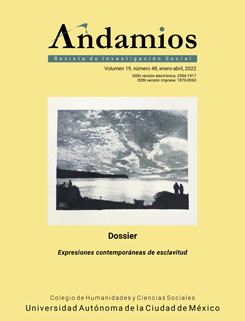Pensar la esclavitud y sus expresiones contemporáneas. Entrevista a Andrés de Francisco
DOI:
https://doi.org/10.29092/uacm.v19i48.903Keywords:
Entrevista a Andrés de Francisco, esclavitud,Abstract
Entrevista realizada a Andrés de Francisco, especialista en el tema de las nuevas formas de esclavitud.
La esclavitud está entre nosotros. No desapareció con la extinción de las sociedades esclavistas antiguas ni se evaporó con la emergencia de las revoluciones modernas asociadas al lenguaje de los derechos. En pleno siglo XXI, las formas de la esclavitud moderna y contemporánea se han diversificado y sus dispositivos de dominación y opresión se han perfeccionado. Millones de personas en América Latina, Estados Unidos, Europa y el mundo entero se encuentran sometidas de facto a condiciones estructurales y existenciales que podríamos representar bajo el sello de la esclavitud: trabajadoras/ trabajadores del hogar, trabajadoras/trabajadores sexuales, migrantes, trabajadores/ trabajadoras agrícolas, niñas y niños, personas de la tercera edad, etcétera.
Para hablar sobre la esclavitud y sus expresiones contemporáneas entrevistamos a Andrés de Francisco. Más que una entrevista tradicional donde predomina una relación asimétrica entre entrevistado y entrevistadores, se trata de un diálogo directo y horizontal entre colegas de “ambos lados del charco” que se ocupan (y preocupan) de algunos de los temas más controvertidos de su tiempo. El Dr. Andrés de Francisco es filósofo y profesor titular de la Facultad de Ciencias Políticas y Sociología de la Universidad Complutense de Madrid (UCM).
Downloads
Downloads
Published
Issue
Section
License
This Journal is licensed under Creative Commons Mexico 2.5. It is allowed to reproduce and disseminate the contents of the Journal for educational or research purposes, not for profit, as long as they are not mutilated and cite the source (Andamios, Revista de Investigación Social) and the author.
The copyright of the articles published in Andamios, Revista de Investigación Social are transferred by the author(s) to Universidad Autónoma de la Ciudad de México when the originals have been accepted, so that they are published and distributed both in the printed and electronic versions of the Journal. However, as established by law, the author(s) retains their moral rights. The author(s) will receive a form of assignment of copyright that they must to sign when their original has been accepted. In the case of collective articles, the signature of one of the authors will suffice, provided that the latter has obtained the consent of the others.
Authors may use the material of their article in other works or books published by themselves, with the condition of quoting Andamios as the original source of the texts.
The articles contained in this publication are the responsibility of their authors and do not compromise the official position of Andamios, Revista de Investigación Social of the Universidad Autónoma de la Ciudad de México.


